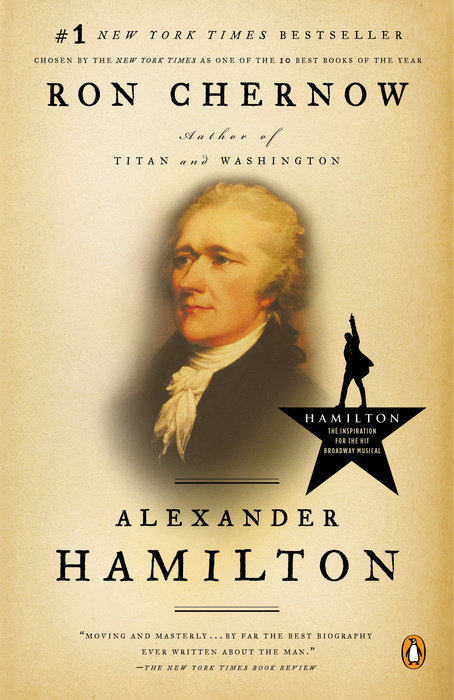Editor’s Note: Can’t get enough of all things “Hamilton”? We have more books for you to explore if you’re having trouble getting tickets to the musical theater phenomenon.
Alexander Hamilton’s life is perhaps best known for its end: he was mortally wounded in a duel with political rival Aaron Burr. But his personal life and political achievements are fascinating, impressive, and—until recently—underappreciated. Here is a man who, though featured on our ten-dollar bill, many Americans know little about. I was certainly one of them for many years.
Growing up, United States history paled in comparison to the mystery of the ancient world or European monarchies and their salacious scandals. I had this terrible misconception that the central figures in revolutionary America were stuffy old men arguing in stuffy old rooms. And then I had one of those life-changing professors who introduced me to the flawed humanity in these historical figures that I had never considered before. Suddenly these people were real, and I wanted to go deeper.
And so I turned to Ron Chernow’s biography of Alexander Hamilton. Chernow is thorough and honest in his examination of Hamilton’s life, and his subject led such an extraordinary existence it makes for a sensational story.
Born out of wedlock in the British West Indies, Hamilton is an immigrant success story. Determined to make his own way at a young age, he studied math and accounting, hired himself out as a bookkeeper, and secured a job—all in his teens. At age sixteen, he came to New York and enrolled in King’s College (now Columbia University), where he pursued law.
The trajectory of his life from there is astounding: he served as General George Washington’s aide-de-camp during the Revolution, handling all of his personal correspondence to the point that he became very effective at forging Washington’s signature; he founded his own legal practice; married and had a family; actively participated in the abolitionist movement; jointly wrote the Federalist Papers with James Madison and John Jay; served as secretary of the treasury; created the Federal Reserve; and even found time to have an extramarital affair.
Chernow writes with respect and admiration for Hamilton, but he doesn’t glaze over his shortcomings and negative qualities. Hamilton was vain, always confident in his ability to find his own solutions. Hamilton was insecure: he never really found his place among the native-born Americans who disdained his lesser wealth and lack of property.
Hamilton was frivolous, always in pursuit of precision and good form, he wrote infuriatingly detailed and opinionated letters on the specifics of military uniforms. Chernow shows Hamilton in the best and worst light, and by not only exposing but exploring his faults, he elevates Hamilton from a one-dimensional character in our nation’s revolutionary mythology to a complex and relatable human being.
Hamilton’s feud with Thomas Jefferson remains one of the most complicated and contentious in all of American history. Chernow pulls the most piercing language and terrible details from personal letters and newspapers to demonstrate the detestable nature of eighteenth-century politics. The whole affair reads like it’s been ripped from tabloid headlines, and while it makes both parties look bad, I found it most illuminating for its examination of Jefferson. A brilliant thinker and inventor, Jefferson is favored by history, his inaction and moral inconsistency often overlooked. But in the context of his fight with Hamilton, his sheer pettiness is remarkable. Chernow rightly takes these men—these giants and legends—and tears them from their pedestals to show them for what they really are: just men.
Chernow’s book has had the greatest impact on me of any biography I’ve read, and I’ve sung its praises many times. It is with no small delight then that I learned that this very book inspired “Hamilton,” the Tony Award-winning musical from Lin-Manuel Miranda. I feel a small sense of something like vindication knowing that Chernow’s beautiful book is making it big on Broadway, but I can’t deny I’m frustrated that tickets are some of the most coveted in town. But of course, people are rightfully clamoring for entry; who doesn’t want to hear a rap battle about the national debt?
Even if I’m not fortunate enough to score seats to the show, I am so pleased that this remarkable book and this remarkable man are making a lasting impression on others. And no matter if I see the performance or not, Ron Chernow brought Hamilton’s story to life for me long ago.
Elaine Wilson is a bibliophile with a soft spot for history books and foreign literature. She is a student of Russian literary translation at Columbia University.








